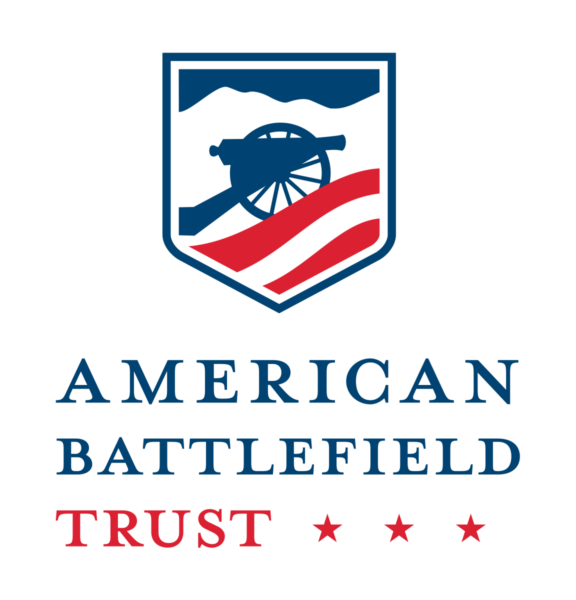In the series premier of our podcast Civil War Curious, historian George Rable answers questions about the significance of religion during the American Civil War—especially its importance to Union and Confederate soldiers.
Transcript
Terry Johnston: Thanks for joining me, George. We have two questions for you, both of which pertain to religion during the Civil War. The first is a two-parter from Rick in Georgia. He asks, “What was the overall religious atmosphere in the United States as the Civil War began? And was there a difference in religious fervor between North and South?”
George Rable: Well, I think the first question is a great place to begin because I think you have to look at the big picture religious atmosphere of the country. And I think most of us have a sense that the mid-19th century was probably considerably more religious than the early 21st century. And you can give a qualified yes to that, but there’s also some surprises along the way. Lincoln, famously, in his second inaugural said both sides prayed to the same God and read the same Bible. And, of course, that was absolutely true. And I think it’s equally true that religious language and imagery and ideas were pretty pervasive in the Civil War era.
But where the surprise comes is how Americans affiliated with religious bodies. In 1855, out of a population of 27 million Americans, one estimate was that about 4 million of these people were a member of some Protestant church. Now, I’ve often asked that question. In giving talks, I’d say, okay, 27 million. How many do you think were associated with some Protestant church? And the answer was always much larger than the actual 4 million. We think of the remarkable evangelical growth in the 19th century, the Second Great Awakening and then the Businessmen’s Revival of the 1850s and that sort of thing. And so I think most of us would think maybe a majority of Americans belong to some church.
But we need to remember too that churches had a more demanding standard of membership than they do today. Baptist churches, for example, required a public profession of faith and then a vote by the congregation. You had to be willing to allow your life to be scrutinized by the minister and other members of the congregation. And so you have a lot of people that are probably attending church but aren’t necessarily members of particular congregations.
Having said that, however, you can certainly see how the pervasiveness of religious language, and what I think is the central theme in terms of looking at the Civil War itself, a really powerful sense of divine providence shaped people’s views of events, including the events of ordinary life. If your wife got sick, if your cow died, if your crops failed, this was seen as a providential event, and perhaps maybe you were being punished for some sin. In a larger sense, the story of the United States was also seen as providential—that America was part of a larger story of human history, a kind of unfolding of providential design. So I think it’s very important to recognize that virtually all religious groups embraced a kind of providential interpretation of events. So that’s the sort of general religious atmosphere. And then divine providence, I think, frames how people are going to view the coming of the war, the course of the war, and the outcome of the war.
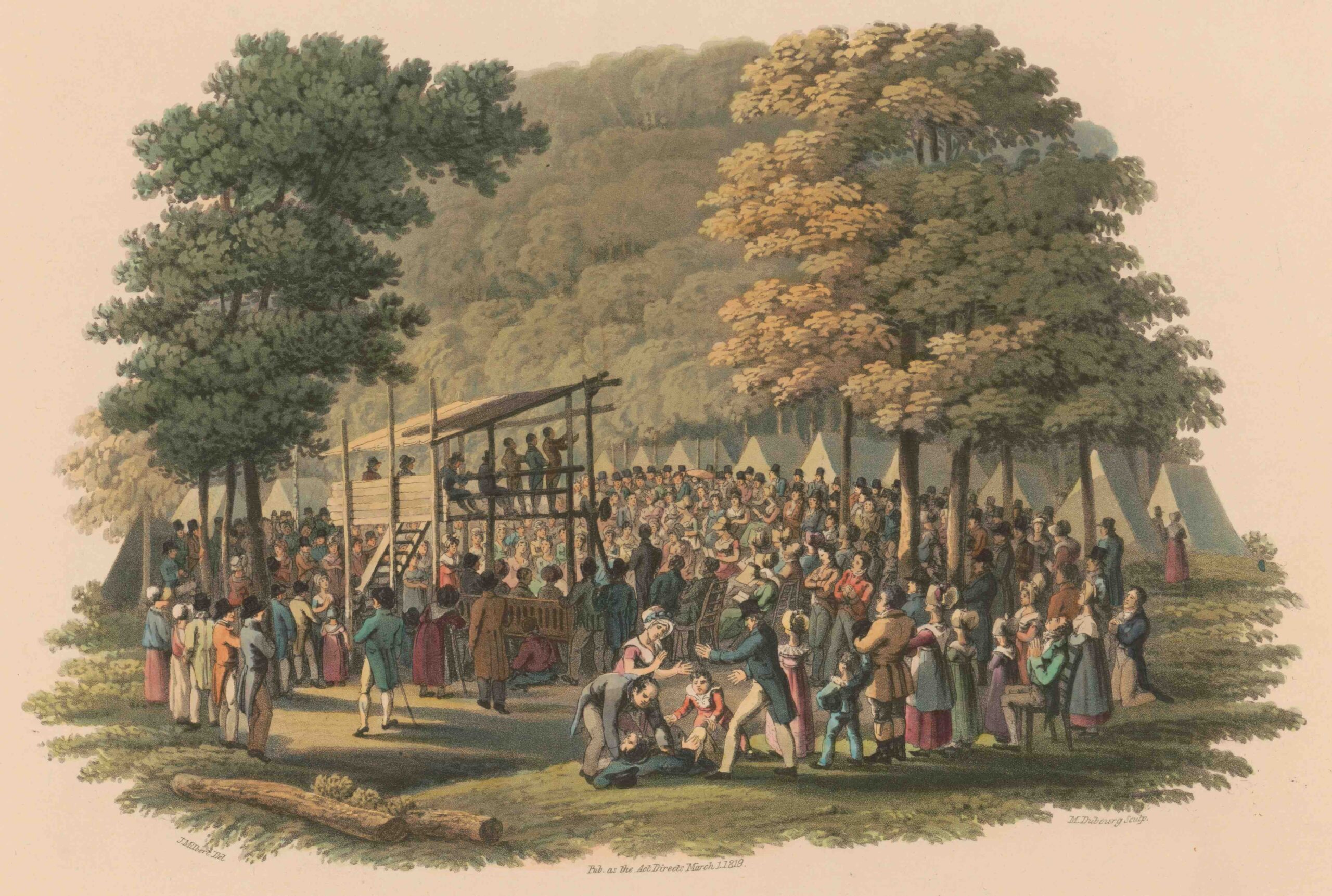 Library of Congress
Library of CongressA Methodist camp meeting during the Second Great Awakening
Terry Johnston: Was there then any difference in that religiosity between North and South in the years before the war?
George Rable: We commonly think of southerners as more religious than northerners in terms of church affiliation, activity, that sort of thing. That’s a very difficult proposition to prove despite the impressions of that. Certainly both sides view their opponents as religiously defective in some ways. Confederates, for example, thought that one of the reasons the war came about was because of political preaching in northern pulpits, particularly anti-slavery preaching. I think northerners increasingly thought perhaps the war had come about because southerners had embraced the sin of slavery. Now, of course, these are gross generalizations because there are lots of northerners that don’t care one whit about slavery. There are certainly southern whites who are hostile to slavery or indifferent to slavery. But still there’s this general sense that somehow your opponents have sinned and are going to be punished. And there’s also a sense that your own side has sinned and were being punished. And so that helps you frame the military events of the war too, which is something we can talk about.
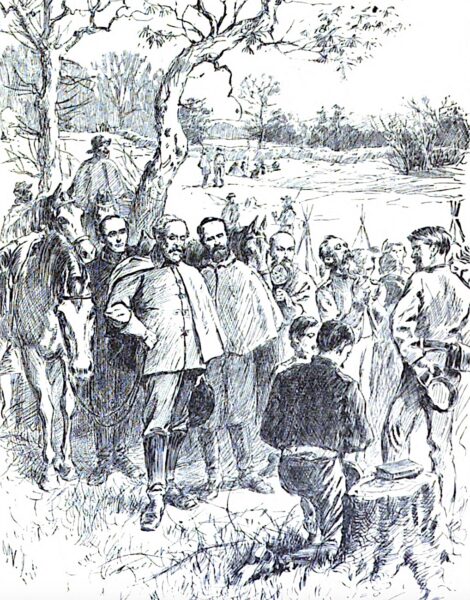 Christ in the Camp (1888)
Christ in the Camp (1888)A postwar illustration depicts Robert E. Lee attending a prayer meeting in camp.
Now, the other way to answer that question is look at religious revivals in the army during the war. And beginning in 1862, you see an outburst of revivalism in the camps, especially in the Confederate camps, focusing not only on the sense of individual salvation, but perhaps the hopes that these revivals would somehow win divine favor. If enough soldiers converted, then perhaps God would bless your cause. Now, one of the reasons we assume that these revivals were more powerful in the Confederate camps than in the Union camps is we have books like J. William Jones’ Christ in the Camp, which documents these at great length. Or [William W.] Bennett’s The Great Revival in the Southern Armies, another book that documents these things at great length. There’s some of that documentation on the northern side, but it’s less pervasive. On the northern side, you might have to look more carefully at the religious periodicals and that kind of thing.
But I think it’s fair to say that the revivals take place in both armies—though I think when you seem to be losing, the revivals seem to be stronger, so that probably meant stronger revivals on the Confederate side. And certainly the revivals begin in the eastern theater of the war and eventually spread to the western theater of the war as well.
Terry Johnston: That’s a good segue into the second question, which is actually about the war itself. Bruce in Texas wanted to know: “What part did religion play on each side during the war?” Now, that’s a big one, as the previous one was, so let’s break that down and start with how religion played a factor in justifying support for the war on both sides.
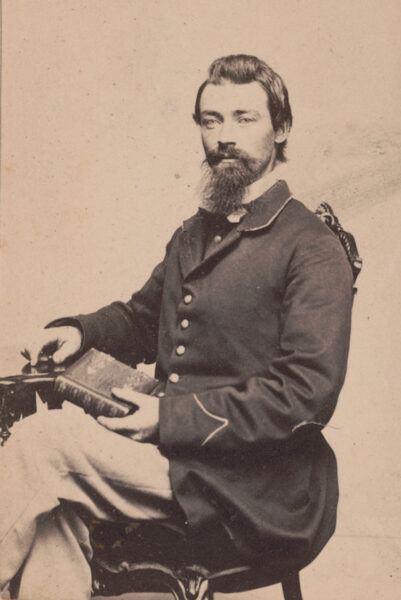 Library of Congress
Library of CongressAn unidentified Union army chaplain poses for the camera with his Bible.
George Rable: Well, it plays a large role in justifying the war on both sides. There’s a tremendous outpouring of sermons, of religious literature that justify the war from a religious and biblical point of view, just as debates on slavery rested on readings of the Bible, usually quite literal readings of the Bible. The same thing is absolutely true during the war itself.
And so you use religion to frame the war, to some degree you use religion to demonize your enemies. The Confederates were very proud that their constitution invoked the favor of Almighty God, whereas the U.S. Constitution was silent on that question.
And, therefore, this proved that the Yankees were basically heathenist and God was on the side of the Confederates. And of course, I think religious people on both sides tended to believe that their side was favored by God, no question about that. Now, of course, they have to explain certain things. What happens when you lose a battle? How do you deal with that? And that’s a question that comes up on both sides, and especially when the Confederates are absolutely losing the war, this becomes a very serious theological question to deal with.
Terry Johnston: In other words, war as a test of faith.
George Rable: War as a test of faith. Historians are actually somewhat in disagreement about this. A lot of historians have argued that the war brings about tremendous religious disillusionment, and you can find examples of that. But it seems to me there’s a kind of stable faith that maintains itself, even in the darkest days.
And especially the prevalence of providential design, which was a very flexible point of view, actually. You might say, well, God is on your side. That’s not a very flexible point of view. But it can be a very flexible point of view, for example, if you win a battle, obviously a sign of divine favor. If you lose a battle, you’re being punished for sin. And the Lord chastises those whom the Lord loves, you know, that particular religious doctrine. So it’s a very flexible point of view. And you can maintain your faith throughout whether you are winning or losing. Now the question arises, and I was asked this question one time at a party, a historian who was working on the Army of Northern Virginia came up to me and said, “How religious do you think these guys were?” And I said, “Well, some of them were very religious and a fair number were not very religious at all.” He said, “Hoo! I’m glad you said that, because I’ve come to the same conclusion.” So there’s a great range. And if you look at soldiers, particularly religious soldiers, commenting on the atmosphere in the camps—certainly pre-revival and even during the revivals—a lot of devout soldiers don’t find the religious atmosphere in the armies all that favorable.
They talk about, you know, there’s no Sabbath in the army. We drill on Sunday. We fight on Sunday. We don’t use the Sabbath as a day of rest. They talk about cursing and gambling and drinking and those sorts of activities. So many of what we would call the ideal Christian soldiers are rather shocked at the religious atmosphere in the camps.
Terry Johnston: You’ve mentioned revivals a few times now. What exactly did they look like? They were primarily a Confederate army phenomenon, if I’m correct. How did this happen, and again, what did it look like?
George Rable: I don’t think it’s necessarily primarily Confederate, because there’s plenty of revivalism in the Union armies, it’s not quite as well documented. And, again, it’s very hard to make comparisons. What did it look like? It could take various forms, sometimes led by chaplains, sometimes led by visiting ministers. A lot of churches sent ministers to visit the camp. Sometimes these revivals were spontaneous, soldier-led. A few soldiers might gather in the evening to perhaps pray or read scripture, something like that. And eventually that would lead to larger meetings and revivalism. But the chaplains and visiting ministers have a great deal to do with it.
In the North, you actually had the Christian Commission visiting the camps, the United States Christian Commission that would hand out tracts, preach, also provide a bit for the physical welfare of the soldiers. And so generally these meetings would take place at night. It was often noted if prominent generals attended. That was of interest. If Lee or Jackson showed up or Rosecrans or McClellan. If generals showed up at this meeting that was highly noted.
Terry Johnston: The presence of generals, was that a factor in keeping these going, or was it just a coincidence that these guys showed up? Commanders like Jackson were famously religious, the fervor was there, so maybe they might have encouraged such activities among their troops?
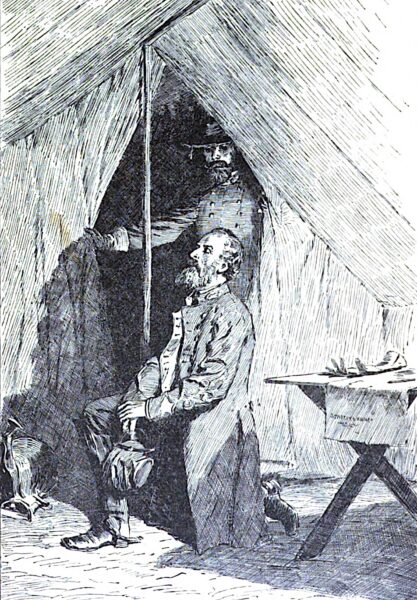 Christ in the Camp (1888)
Christ in the Camp (1888)A postwar illustration depicts Confederate general Thomas J. “Stonewall” Jackson “preparing for battle” through prayer.
George Rable: I think it was a happy circumstance that they showed up. You don’t see the generals necessarily promoting these things. During the war, there is a sort of debate about whether a Christian soldier was a better soldier. And a number of people thought the answer to that was ‘yes.’ But there are also some doubters. Particularly if your religious faith might make you reluctant to kill.
And, of course, the question becomes from the very beginning: Should devout religious soldiers—Christian, Jewish, whatever—engage in war itself? And, of course, there are peace churches, the Quakers, Mennonites, etc., who try to maintain a witness against war and against killing. The Quakers in particular have trouble because a lot of their young men go off and fight—contrary to the teachings of the church. And then they have to decide, are they going to face any kind of church discipline for doing that? But the peace witness, you’re talking about a relatively small number of people and what generally happens when the war breaks out, the churches go with their own section. If you’re a Presbyterian in the North, you support the Union. If you’re a Presbyterian in the South, you support the Confederacy.
The Catholics are a bit of an exception in that northern Catholics have an interesting take on the coming of the war. Some of them blame it on Protestants. They argue that Protestantism is inherently divisive and schismatic. And so when you have a multiplication of Protestant sects, you’re going to have division, hence the war. And, certainly, the Catholic bishops are not nearly as fervent for the war as many Protestant ministers are. And the Catholic church, of course, does not divide during the war. Having said that, northern Catholics go with the North. Southern Catholics generally go with the Confederacy, with some exceptions.
Terry Johnston: I want to circle back to something you mentioned earlier about soldiers using religion to demonize the enemy. In what ways did they actually do that?
George Rable: Well, they view the enemy as religious heretics in one way or another. They point out that Confederates would, for example, say that anti-slavery, abolitionists, northerners ignore the plain language of scripture, which justifies slavery. Again, going back to the antebellum arguments about scripture and slavery. Northern soldiers of a deep religious bent believed that this war is a judgment on the nation for the sin of slavery. And a number of them believe, therefore, slavery has to be eradicated before the Union can prevail. And so from their point of view, Confederates who embrace slavery are really adopting a very dangerous heresy that’s contrary to religious principles. And that’s part of this attempt on both sides to demonize the enemy, which is important. It’s been studied more from the Confederate side than for the northern side, but the northern side does the same thing. The problem with the northern side is if you’re fighting to restore the Union and bring these folks back into the fold, if you will, there has to be limits on how much you demonize them.
Whereas for the Confederates, if you want to make a break here, there are fewer restraints on how you can demonize the enemy. And I think, of course, demonizing the enemy probably keeps the fighting going on longer. You can’t really prove that in any empirical sense, but I think it has to play some kind of a factor there.
Terry Johnston: Okay. Well, are there any other significant ways that religion played a role in the lives of Union and Confederate soldiers that we should mention?
George Rable: Well, I think in terms of the soldiers themselves, we might talk a little bit more about how they view their own role. I think the idea of duty to enlist is connected to religion. Christian duty. The ideal of the Christian soldier is a very important one. And soldiers and civilians both talk of a heavenly reunion with families for the soldiers who died. You know, you’ll meet your family in heaven once again. Which is, I guess depending on the attitudes toward members of your family, that’s a good thing. And so sometimes they paint rather vivid pictures of this heavenly reunion.
The other thing that happens is there’s a lot of talk about the deaths of particularly devout soldiers and how this sets such a good example. They’re eulogized in sermons. Sometimes entire pamphlets are published about their life. A lot of people also value the final words of their loved ones. In the mid-19th century, people died at home. You were used to being with your loved one up to their last moments. You were used to hearing their dying words. Well, obviously, the people at home cannot hear the soldiers’ dying words, but they really appreciated if somebody reported that. And there’s all kinds of dramatic stories about soldiers’ final words in religious publications, tracts, that sort of thing. And that whole thing provided some comfort for people at home because the people at home were absolutely worried about what would happen to their soldiers in terms of disease, wounds, and death.
They were also worried about their spiritual welfare. A lot of people at home absolutely believed that army camps were not a place where religious faith was going to prosper. And they worried that their loved ones were going to be just corrupted by their experience in the army. And, so, mothers and fathers send their boys off to war with admonitions. Don’t start swearing like the people will do in camp. Don’t take to drink. Don’t gamble, etc. And so there’s great concern about what they often term the temptations of camp and what effect this would have on the soldiers’ spiritual lives, and would they return unfit for society.
The other thing we might mention is you not only have final words, you have all these accounts of testaments that were handed out to the soldiers by churches, religious groups, etc., stopping bullets. You have countless accounts of that. The one sarcastic Confederate told his mother, it was actually a pack of cards rather than a Bible that stopped the bullet. Often these are reported in great detail. They’ll tell you the exact passage of the Bible where the point of the projectile stopped. And this always seemed to have some great significance. So there’s that part of the story.
If we have time, I’d like to mention Lincoln’s second inaugural, which is probably the greatest meditation on religion in the war.
Terry Johnston: Please do.
George Rable: I think it’s the greatest address given by an American president. I think it eclipsed the Gettysburg Address. And what Lincoln says in that second inaugural is so remarkable in a number of ways. The war’s winding down, the Union appears to be winning. Lincoln does not say anything really about his own role in that. He simply says the military situation seems favorable. There’s no bragging, there’s no celebrating, nothing like that. He simply notes that both sides had not expected the war to last so long and be so bloody.
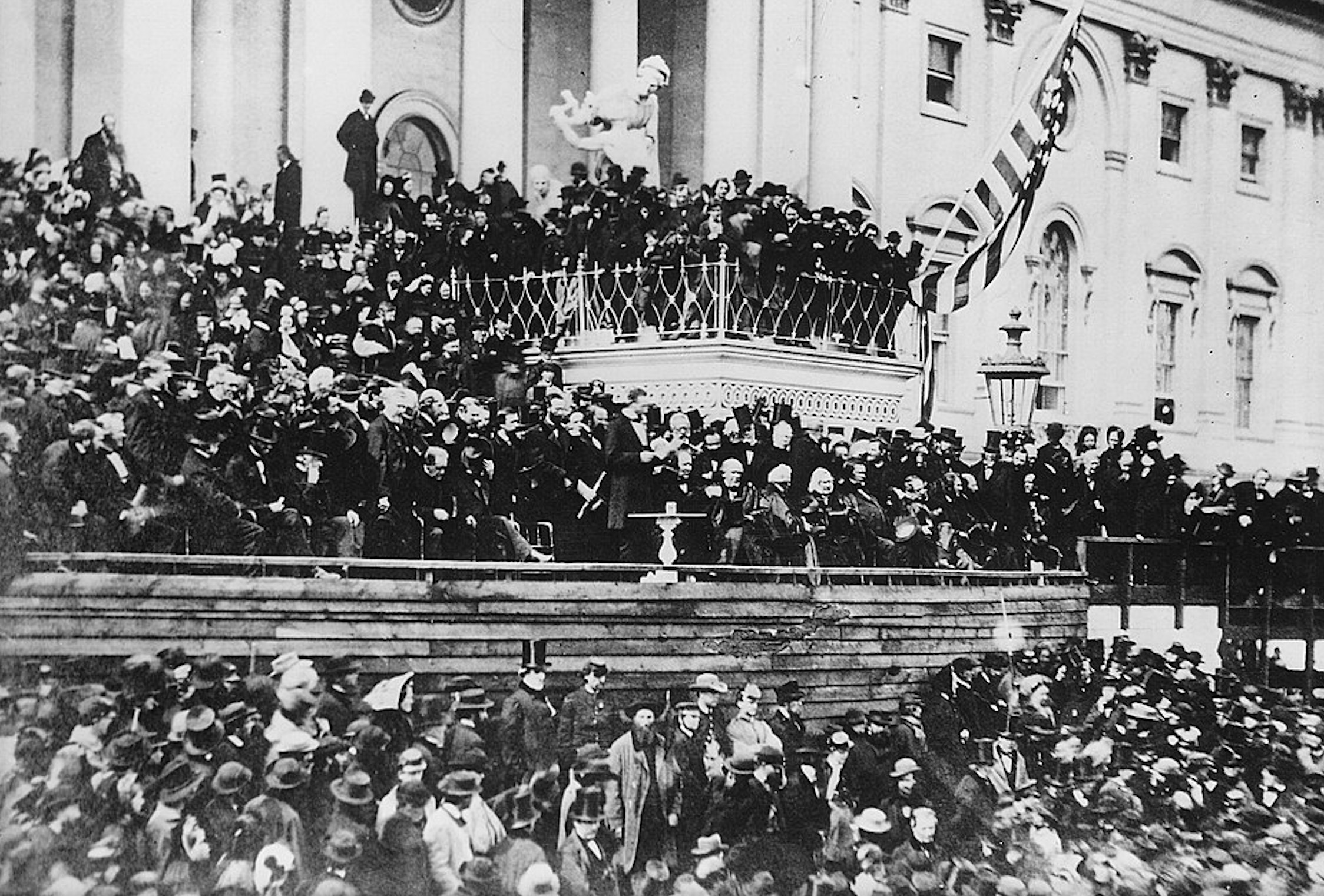 Library of Congress
Library of CongressAbraham Lincoln delivers his Second Inaugural Address on March 4, 1865.
He has that famous passage about both sides praying to the same God, reading the same Bible. He says that each looked for an easier triumph. He says the prayers of both sides could not be answered. Now that was an interesting point because a lot of people in the North at this point would say, “Our prayers are being answered.” And then Lincoln says, the prayers of both sides could not be answered. That of neither has been answered fully. And his key point, the Almighty has His own purposes. Now, many people might affirm that, but I think a lot of people would prefer that the Almighty had their purposes and not the Almighty’s purposes.
So Lincoln is saying, wait a minute before you decree that God has been on our side all along, let’s pause on this. And then, of course, in the famous passage, he says if slavery was such an offense to God that the war had to continue, that both the North and South had to endure a terrible war. Then Lincoln could only conclude in the words of Psalm 19, “The judgments of the Lord are true and righteous altogether.” So Lincoln offers no answers here. He really offers no answer. He says the Almighty has his own purposes. And it may be difficult for human beings to discern those purposes.
You’ve lost so many men in this conflict. What does that mean? What does that mean? That really becomes the question. And Lincoln doesn’t offer a very clear answer. And a lot of religious historians would argue that the second inaugural was the most profound theological meditation on the war, something that Lincoln had steadily developed. And it fit into this framework of providence. Divine providence becomes an important framing device, for Lincoln as it had for countless Americans, including the clergy, including African-American clergy, who argued that the war was clearly a punishment for the sin of slavery.
Terry Johnston: This deep sense among the Confederates that God was on their side—does that lead to any kind of crisis of faith as the war begins to turn clearly against them?
George Rable: It does for some, but they can also say, look, if you look at the Bible, how many times did the Lord use heathen nations to punish the children of Israel? Let’s look at the Old Testament. And of course, in many ways, the Old Testament, I think for both sides, becomes more important than the New Testament during this war. In fact, one northern clergyman at one point said we need to start paying attention to the more war-like Psalms.
So there’s that part of it. And again, the flexibility is so great with this that you can endure defeats and still think, okay, we’re being punished for our sins, but it’ll all be right in the end. And that’s why I think there’s not as great a crisis of faith as some historians have believed, because this providential view is remarkably malleable and flexible. It can explain all sorts of things.
Terry Johnston: Is that malleability something that continues even after the war, in the shadow of defeat?
George Rable: To some extent. I was at a conference one time and I said, well, there were all these people talking about disillusionment. And I said, have you attended a funeral recently? We still use a lot of this framing. It was God’s will. It was this person’s time to die. That’s why they died. It was their time and it’ll all be fine. So that framework has not died out at all, I don’t think. There’s obviously changes in the American religious landscape, dramatic changes over the years, certainly in our time. But a lot of this is still around.
In the aftermath of 9-11, for example, there were ministers who said, okay, this is punishment for sin. Obama’s minister, Jeremiah Wright, got in all kinds of hot water for saying that, but so on the other side did Pat Robertson. And journalists were shocked by this. What is this? Where did this come from? Well, they didn’t know very much about American religious history. It had been around a long time.
Terry Johnston: So, in other words, Civil War soldiers would not have been shocked.
George Rable: No, they wouldn’t have been. They would’ve looked at the outcome of the war. Rather than saying, as [George] Pickett supposedly said, that the Yankees had something to do with the outcome of Gettysburg, they would say God had something to do with the outcome of the war. And I think people on both sides were convinced of that. And Confederates can accept defeat in the sense, okay, this is God’s will. We have been punished for sin, but maybe God can still redeem us. Maybe our cause is not entirely lost, or maybe it’ll take a new shape. So it’s very malleable. And of course, religion is very important in the cult of the Lost Cause.
Terry Johnston: It certainly was. Their cause definitely took on a new shape in the postwar years. So the influence of faith continued well past Appomattox.
George Rable: Absolutely. And of course, Lincoln’s assassination is also a test of faith. Why was Lincoln assassinated? Is he like Moses, who’s not allowed to see the promised land? And so does Andrew Johnson become Joshua? Kind of an unlikely tale. Some people believed that Lincoln was assassinated because he was going to be too lenient with the Rebels. That argument was made. And so again, this idea of providence is so flexible and so useful. It can be trotted out for all kinds of purposes. And that’s why religion in the Civil War is a very, very large topic.
About the Guest
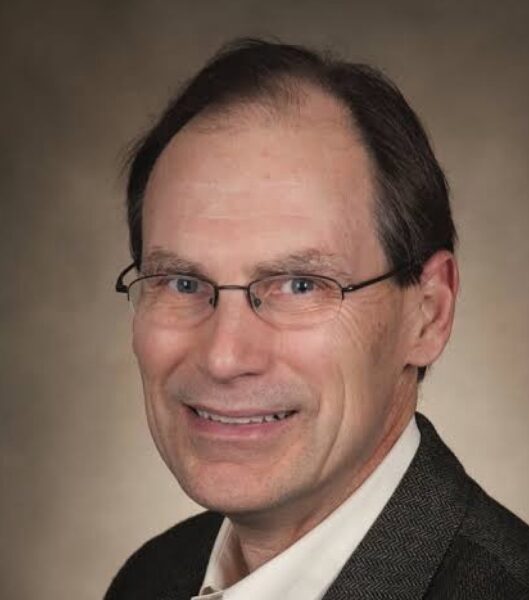 George Rable is professor emeritus at the University of Alabama. He has written a number of critically acclaimed books on the Civil War era, including God’s Almost Chosen Peoples A Religious History of the American Civil War (2010).
George Rable is professor emeritus at the University of Alabama. He has written a number of critically acclaimed books on the Civil War era, including God’s Almost Chosen Peoples A Religious History of the American Civil War (2010).
Additional Resources
- J. William Jones, Christ in the Camp (1887)
- William W. Bennett, The Great Revival in the Southern Armies (1877)
- United States Christian Commission
- Abraham Lincoln’s Second Inaugural Address
